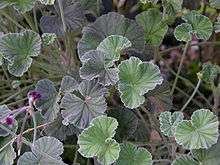Pelargonium sidoides
Pelargonium sidoides is a plant native to South Africa. Its common names include African geranium and South African geranium.
| Umckaloabo | |
|---|---|
 | |
| Scientific classification | |
| Kingdom: | Plantae |
| Clade: | Tracheophytes |
| Clade: | Angiosperms |
| Clade: | Eudicots |
| Clade: | Rosids |
| Order: | Geraniales |
| Family: | Geraniaceae |
| Genus: | Pelargonium |
| Species: | P. sidoides |
| Binomial name | |
| Pelargonium sidoides DC. | |
Description
African geranium forms a basal rosette of cordate leaves with a velvet texture and a few short trichomes on long petioles.[1] Its flowers have five dark red to nearly black petals, two of which are sometimes fused. It is often found in flower nearly year-round. It prefers to grow in grasslands with rocky soils. It can be difficult to distinguish from Pelargonium reniforme which grows in a similar area, but tends to have more kidney-shaped leaves.
Uses
A 2013 Cochrane review found limited to no evidence of benefit with Pelargonium sidoides root extract for the symptoms of acute bronchitis, the common cold and acute rhinosinusitis.[2] A summary of this review found that all studies were "from the same investigator (the manufacturer) and performed in the same region (Ukraine and Russia)."[2]
Root extract of Pelargonium sidoides may be sold as a dietary supplement or traditional medicine under various brand names, including Umckaloabo and Zucol, but there is limited high-quality clinical evidence it provides any benefit.[3]
References
- Lis-Balchin, Maria (2003). Geranium and Pelargonium: History of Nomenclature, Usage and Cultivation. Boca Raton, Florida: CRC. ISBN 978-0-203-21653-8.
- Timmer, Antje; Günther, Judith; Motschall, Edith; Rücker, Gerta; Antes, Gerd; Kern, Winfried V (2013). "Pelargonium sidoides extract for treating acute respiratory tract infections". Cochrane Database of Systematic Reviews (10): CD006323. doi:10.1002/14651858.CD006323.pub3. PMID 24146345. Lay summary – Cochrane (22 October 2013).
- "Pelargonium". Drugs.com. 21 November 2019. Retrieved 28 April 2020.
